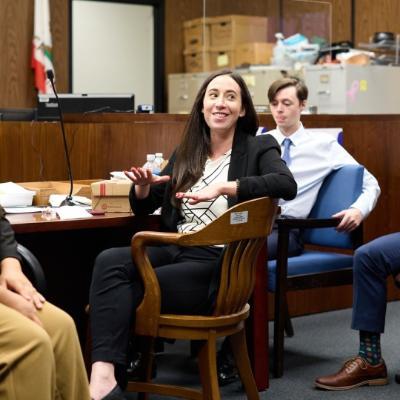
Juvenile Justice Clinic (JJC) social worker Elyse Kupfer’s passion for youth advocacy began as an undergraduate at the University of Oregon, where an Inside-Out class opened her eyes to the realities of the youth justice system. During her Master of Social Work (MSW) program, she connected with the Youth Justice Education Clinic’s Cindy Galvan, ultimately leading to her current role at JJC.
1. How does JJC support justice-involved youth?
The JJC provides free, holistic defense representation to youth facing delinquency charges ranging from simple misdemeanors to felony murder transfer cases, where youth face the possibility of being sentenced in adult court, sometimes facing 25 years to life in adult prison. Our small clinic supports clients, both incarcerated and in the community, from the moment they are arraigned until they are free from the supervision of probation entirely. Our small case load and holistic model allows us to provide elite, trauma-informed representation, meaningful and consisted face-to-face contact, and resourcing and support both to our clients and their family as they navigate a violent system.
- My work in the JJC varies greatly, and no day is the same. For instance, I attend every court appearance, providing mitigating information to our attorneys and law students, and being prepared to speak on record on behalf of our clients. I conduct weekly visits with our clients in detention centers, homes, and placements across the county, sometimes with the purpose of gathering information for mitigation reports, ensuring community-based youth are resourced, and providing general emotional support while our youth face the one of the hardest moments in their young life.
- I ensure youth are enrolled in school, and assisting with implementation of individualized education plans for youth with learning needs, often in collaboration with YJEC. I write mitigation reports — this requires up to 80 hours of interviews with clients, their families, and service providers, gathering supplemental documentation and academic psychosocial research, and ultimately writing a report that can be up to 70 or more pages in length. The purpose of mitigation reports is to contextualize the bio-psycho-social history of our clients for the judge and district attorney, to humanize the client beyond the worst decisions they have made, with the ultimate goal of reducing their sentence or even dismissing charges.
2. What has been the standout moment of your experience?
My greatest accomplishment and achievement I’m most proud of is a 70-page mitigation packet that helped us keep one of our youths in the juvenile justice system; he was facing 25-life on a murder charge and was instead sentenced to three years at Barry J. Nidorf, the Secure Youth Treatment Facility in Sylmar.
I provide letters and reports to the courts to support our clients receiving reduced sentences and getting released to the community from detention.
3. What are some things you encounter with your young clients that you wish more people were aware of?
I wish more people were able to understand that our young clients are not “bad kids” but rather a product of a social system, entrenched in systemic racism, that pushes them towards a path of incarceration. I wish more people saw the systemic poverty, neighborhood violence, and lack of resources that led our clients to the choices they have made. I wish more people took seriously the science of adolescent brain development and the impact on decision making. I wish more people understood that probation and detention is not set up to rehabilitate but rather causes further irreparable harm and trauma. I wish more people took the time to understand our client’s stories, character, and hearts. I wish more people believed in them.
4. What is the most rewarding thing about your job?
This is the hardest job I have ever had. Each day, it is our job to fight against a violent system that is designed not to rehabilitate but to “punish” and traumatize children in their most vulnerable moments and critical stages of development. We face a lot of losses and heartaches as we walk alongside our clients in this system.
In light of that, it is hard to qualify what “rewarding” means. We do have wins, we get charges dismissed, we get house arrest instead of detention, we get our kids back to the community, we get them reduced sentences. We celebrate every win, no matter how small, because it can feel like they are few and far between. But for me, the most rewarding part is gaining a client’s trust. Our youth are conditioned to be “tough” and untrusting, and it is the single greatest experience when they allow me to see their vulnerable side and learn their true selves.
Above and beyond, the greatest reward is witnessing them transform into thoughtful, gentle young people and truly seeing the way meaningful investment in our clients can propel them towards growth and success.
5. Why are social workers so important to JJC and YJEC?
Social workers are important to JJC and YJEC because of the inherent overlap of the legal system and social work. Our youth end up in these systems due to lack of support and resources in the home and community, trauma, and other mental health issues, drug addiction, survival. As social workers, we can help intervene in those cycles to identify resources and support that can provide long-term outcomes to avoid further contact with the system. I also believe that our role provides a unique ability to provide the emotional support, care, and attention that often is lacking in the realm of legal defense. I often receive reactions of surprise and admiration for our model from our clients, probation, community; what we do is incredibly unique and important.